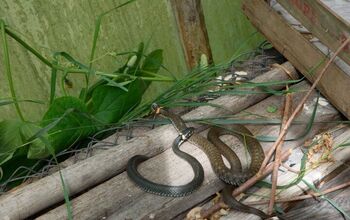How To Keep Iguanas Out Of Your Garden

Iguanas may not be as dangerous as they look but finding them in your yard is still a nuisance. Everything from their unique figure and long claws to their slender tongues can be off-putting. That’s why you may understandably wonder how to keep iguanas out of your yard.
Mow your lawn weekly and regularly remove leaves, branches, and other debris that can attract iguanas to your yard. Put a fence or wire barrier around your fruit and vegetable-bearing plants to deter iguanas. You can also keep iguanas out of your yard with natural repellants like cayenne pepper and cedarwood oil.
Call a local wildlife removal service if you find an iguana in your yard or your home and it won’t leave. Follow along as we explore how to humanely keep iguanas out of your garden.
How To Get Rid Of Iguanas In Your Yard
Some people jump to conclusions and think they should set harmful traps to get rid of iguanas. However, doing so is inhumane and only serves as a temporary solution. Today, deterring iguanas in a humane way is easier than ever thanks to a few simple methods, such as:
1. Keep Your Garden Clean
Iguana-proofing your garden is easy if you keep the area tidy and stay on top of lawn maintenance. Naturally, iguanas love to explore overgrown lawns with tall grass, thick brush, and dense weeds. Debris, rocks, branches, and leaves can also attract iguanas to your yard.
After all, they are herbivores, and they love to burrow in dense, overgrown, and messy yards. Iguanas may view your yard as a steady food source if it’s full of overgrown greenery. Ideally, you should mow your lawn weekly during the growing season, which typically spans from early spring to mid-to-late summer.
Blow the grass clippings away or collect and bag them to avoid attracting iguanas. Walk through your yard and garden, collect debris, and pull weeds. The less overgrown and messy your yard is, the less likely you are to see iguanas.
2. Wrap Your Trees
Whether it be from experience or one of many viral videos, you probably know that iguanas climb trees and sometimes fall on people. You’re not alone if this is your worst nightmare, but it doesn’t mean you’re doomed to experience it. Many Florida homeowners experience this and create physical barriers to protect their trees from iguanas.
Unfortunately, the best way to iguana-proof your trees is to wrap them with sheet metal. This may not look great, but it makes climbing a tree difficult. That’s especially true on cold days, as metal is sensitive to outdoor temperatures.
You can also use clear plastic wrap if you don’t want the barrier to be as noticeable. Some people buy commercial iguana tree wraps to protect their trees. It’s a small price to pay for the benefit of keeping iguanas out of your yard.
3. Protect Food Sources
Iguanas are herbivores, so they often wander into yards that have fruit and vegetable gardens. Some people get rid of their fruits and vegetables to deter iguanas in their gardens. However, you can avoid this sacrifice if you protect your crops instead.
The best way to do this is to create a mesh or wire barrier around your fruits and vegetables. However, you must remember that iguanas are great climbers, so you must get creative. Ideally, you should create a barrier that would be hard to climb.
Iguanas can burrow underground, so you must make sure the fence or barrier is deep enough. Install the barrier so that it extends at least 12” below the ground. Otherwise, you may still catch iguanas eating your fruits and vegetables.
4. Plant Iguana-Repellents
Iguanas are herbivores, but that doesn’t mean that they love all plants equally. Many plants repel iguanas because of their strong scent, and iguanas have a strong sense of smell. Their sense of smell is similar to snakes in that they have a Jacobson’s organ in their mouths.
That’s why you may often see iguanas and snakes flicking their tongues in and out of their mouth, as that’s how they smell. You can use this to your advantage and fill your garden with plants that iguanas don’t like. Luckily, many of the plants that repel iguanas are also beautiful and can help improve your yard.
Plants like oleander, lilyturf, dracaena, lemongrass, agave, and citrus trees can all repel iguanas. Each of these plants either produces strong odors that iguanas don’t like, or they have unpalatable leaves.
5. Block Entry Points
Iguanas are known to burrow and sneak through gaps in yards. They may seem slow and lazy, but it won’t take long for them to find gaps in your fence and property barriers. That’s why you must walk around your yard and identify weak points where iguanas can easily enter.
Seal the gaps you find with dirt, rocks, and even plants. Dense bushes can help fill gaps while also complementing your yard. However, you must be careful and make sure the bush doesn’t have an enticing odor that iguanas like.
Bushes that bear citrus fruit are the best option if you want to go that route. Otherwise, you may simply need to repair or replace your fence. Make sure the fence extends beneath the ground to stop iguanas from burrowing underground.
6. Scatter Natural Deterrents
You’d be surprised at how many amazing iguana repellents you can find at grocery stores. For example, cayenne pepper, cedarwood oil, garlic, and peppermint can all repel iguanas. You can even scatter lemon peels in your yard and garden to humanely get rid of iguanas.
However, placing natural deterrents in your garden is a temporary fix as the smell will eventually wear off. There’s also a chance that other animals may eat or displace the cayenne pepper or citrus peels. That’s why some homeowners consider this an ineffective way to get rid of iguanas.
However, it works quite well if you keep up with it. Simply scatter more pepper and essential oils occasionally to enjoy the benefits throughout spring and summer.
Can Iguanas Harm Humans?
Iguanas can harm humans, but they don’t typically act aggressively toward people. They aren’t predators, as they primarily eat plants, so they don’t seek out humans and animals. However, some young iguanas eat insects and small animals, like other lizards.
That said, iguanas are territorial and defensive, especially during the mating season. The iguana mating season typically lasts between October and November when it’s dry outside. However, they are known to mate from fall until early spring, so it depends on the weather and iguana population.
This is when you may find iguanas fighting each other over a mate. Granted, that doesn’t mean that you’re in danger, as iguanas don’t see people as competitors in the mating pool. Even still, it’s a great idea to be cautious near trees as iguanas sometimes fall on people.
What To Do If You Find An Iguana
Keep calm if you find an iguana and avoid touching it, as their claws are sharp. Remember that the iguana is probably more scared of you than you are of it. Keep an eye on the iguana and call a local animal control service, so they can remove it.
Wildlife removal professionals are equipped to safely remove iguanas without harming them. However, you should avoid placing harmful traps or acting aggressively toward iguanas. They mean no harm, so there’s no reason to hurt them.
Summing It Up
The best way to keep iguanas out of your garden is to regularly mow your lawn and remove debris as needed. It’s also a great idea to seal gaps in your fence and yard border to stop them from coming through. Scatter natural repellents like cayenne pepper and peppermint oil and use plants like oleander and dracaena to repel iguanas.
Related Guides:

Nick Durante is a professional writer with a primary focus on home improvement. When he is not writing about home improvement or taking on projects around the house, he likes to read and create art. He is always looking towards the newest trends in home improvement.
More by Nick Durante



























